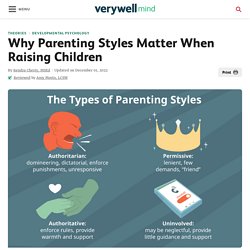

The two dimensions of parenting principle. Four types of parenting styles. Why Parenting Styles Matter When Raising Children. Developmental psychologists have long been interested in how parents affect child development.

However, finding actual cause-and-effect links between specific actions of parents and later behavior of children is very difficult. Some children raised in dramatically different environments can later grow up to have remarkably similar personalities. Conversely, children who share a home and are raised in the same environment can grow up to have very different personalities. Despite these challenges, researchers have posited that there are links between parenting styles and the effects these styles have on children. And some suggest these effects carry over into adult behavior. The Four Parenting Styles In the 1960s, psychologist Diana Baumrind conducted a study on more than 100 preschool-age children. These dimensions include disciplinary strategies, warmth and nurturing, communication styles, and expectations of maturity and control.
How Parenting Affects Your Child's Brain.
Outcomes of Authoritarian Parenting. What is Authoritative Parenting? Outcomes of Authoritative Parenting. What is Permissive Parenting? Outcomes of Permissive Parenting. What is Uninvolved Parenting? Outcomes of Uninvolved Parenting. Compare the styles. Authoritarian Vs. Authoritative Parenting. Permissive Vs. Uninvolved Parenting. Parenting Style Quiz. Instructions: This quiz is designed to help you better understand your parenting style.

For each item, indicate how much you agree or disagree with the statement. This takes most people about 4 minutes to complete. Take your time and answer truthfully for the most accurate results. (If both parents are available, they should both take the quiz and then compare their parenting styles.) Psych Central Research Team Psych Central quizzes are developed by Dr. APA Reference Research Team, P. (2018). 4 Tips for Parenting Teens. What do you do?

What actually helps? We talked to two experts, and an important theme emerged: empathizing with your teen and making sure they feel heard. Here’s how. Have an open communication policy. If you create an atmosphere where your teen feels like they can talk to you — without feeling judged — they’re much more likely to keep you in the loop about their life, said Liz Morrison, LCSW, a psychotherapist who specializes in teen counseling.
Your teen will be much more likely to come to you when they’re struggling — instead of trying to handle a problem on their own. For instance, Morrison worked with a teen who was stealing clothes from other students, which prompted her mom to seek therapy. As Morrison said, “After understanding the situation better, it became more clear that the daughter felt she was living in a space where there was no open communication.” Practice reflective listening. Again, the power of non-judgmental listening can’t be over-stated. 4 Tips for Parenting Teens.